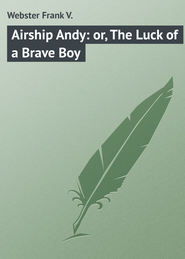По всем вопросам обращайтесь на: info@litportal.ru
(©) 2003-2024.
✖
The Boy Pilot of the Lakes: or, Nat Morton's Perils
Настройки чтения
Размер шрифта
Высота строк
Поля
"Nat thinks you have something that belonged to his father," said Mr. Weatherby, pleasantly.
"He does, eh?" snapped the mate. "Well, he's mistaken, that's all I've got to say. Now I wish you'd get out of here. I'm busy."
"But it won't do any harm to make some inquiries," went on the pilot. "Do you mind showing me the pocketbook?"
"There it is!" said Mr. Bumstead suddenly, pulling the wallet in question from his pocket. "He said it had his father's name on? Well, it hasn't, you can see for yourself," and he quickly turned the pocketbook from side to side, to show that there were no letters on it. Then, without giving Mr. Weatherby a chance to look at it closely, he thrust it back into his pocket.
"Are you satisfied?" he demanded. Nat hesitated.
"I – I suppose so," answered the pilot. "There is no name on that. Nat must have been mistaken."
"I told him he was dreaming," answered the mate, with a leer. "Now don't bother me again."
"Are you sure you saw the name on that pocketbook?" asked Mr. Weatherby of Nat when they were out on the main deck.
"Positive."
"Perhaps it was some other wallet."
"No, it's the same one. I can tell because there's a dark spot on one corner, where it got some oil on once, dad told me."
"But his name is not on it," remarked the pilot. "I had a good enough look at it to determine that."
"I can't account for it," went on Nat, more puzzled than ever. He knew he had seen the name, yet now, when he had another sight of the wallet, it had disappeared. And no wonder, for the mate had done his work well, and had so smoothed down the leather, where he had scraped off the letters, that it needed a close inspection to disclose it. This close inspection Mr. Bumstead was determined neither Nat nor the pilot should make.
Though he said nothing to Nat about it, Mr. Weatherby had some suspicions concerning the mate. For a long time he had distrusted the man, but this was because of certain things that had occurred aboard the Jessie Drew. Now there was something else. Mr. Weatherby questioned Nat closely as to the incidents connected with Mr. Morton's death. When he had learned all he could he remained a few moments in deep thought. Then he said:
"Well, Nat, don't think any more about it. It is very possible you were mistaken about the pocketbook. That form of wallet is not uncommon, and of course there are lots of men with the same name your father had. Why the mate should have a pocketbook, with some other name on it than his own, I can't explain. But we'll let matters lie quietly for a while. If you see or hear anything more out of the ordinary, let me know."
"I will," promised Nat; and then he had to go to do some work in the captain's office.
"I think you will bear watching, Mr. Bumstead," murmured the pilot, as he went back to take the wheel. "I don't like your ways, and I'm going to keep my eye on you."
On his part the mate, after the visit of Nat and Mr. Weatherby, was in a somewhat anxious mood.
"I wish that boy had never come aboard," he mused. "I might have known he would make trouble. I must be more careful. If I had only been a few hours sooner my nephew would have had the place, and I would not have to worry. Never mind. I may be able to get him here yet, but I must first get Nat out of the way. He is too suspicious, and that sneaking pilot is helping him. Still, they know nothing of the case, nor how I got the wallet, and I'll not give it up without a fight. I must hide that pocketbook, though. Lucky I got the name off, or I'd be in a pretty pickle. If I had known he was Jim Morton's son I would almost have given up my place, rather than be on the same boat with him. But it's too late now."
He placed the wallet in a secret drawer in his safe, and then went on with his work, but it seemed that his attention was distracted, and several times he found himself staring out of his cabin window at nothing at all.
Nat tried to follow the pilot's advice, and give no more thought to the memento of his father which he had so unexpectedly discovered, but it was hard work.
For the next few days he was kept very busy. Captain Marshall found plenty of tasks for him, and, with running errands for the commander and the two mates, attending to what the purser had for him to do, and rendering occasional services for the pilot, the lad found himself continually occupied.
He was learning more about ships than he ever knew before, and on one or two occasions Mr. Weatherby took him into the pilot-house, and gave him preliminary instructions in the exacting calling of steering big vessels.
The freighter had stopped at several ports, taking on cargo at some, and discharging it at others. All this made work for Nat, but he liked it, for he was earning more than he had ever received before.
"Nat," said Mr. Dunn, one day, "I wish you would go down into the forward hold, and check over those bales we took on at the last port. We've got to deliver them at the next stop, and I Want to be sure the shipping marks on them correspond to the marks on my list. I had to put them down in a hurry."
"All right," answered the boy. "Here are the manifest slips all written up, Mr. Dunn," and he handed the purser some blanks, filled in with figures.
"That's good. You are doing very well, Nat Keep at it and you'll get a better job soon."
Taking a lantern Nat went down into the forward hold, to examine some bales of goods, in accordance with the purser's instructions. The bales were heavy ones, but they had been stowed away in such a manner that the shipping marks were in sight.
As Nat left the purser's office a man, who had been standing near a window that opened into it, moved away. The man was the mate, Mr. Bumstead, and as he saw Nat disappear below the deck he muttered:
"I think this is just the chance I want. We'll see how that whipper-snapper will like his job after to-day."
While Nat was checking off the bales, finding only one or two slight errors in the list the purser had given him, he heard a noise forward in the dark hold.
"Who's there?" he asked, for it was against the rules for any one to enter the cargo hold, unless authorized by the captain, mate or purser.
No answer was returned, and Nat was beginning to think the noise was made by rats, for there were very large ones in the ship. Then he heard a sound he knew could not have been made by a rodent. It was the sound of some one breathing heavily.
"Is any one here?" asked Nat. "I shall report this to the purser if you don't answer," he threatened.
Still no reply came to him.
"Perhaps it is one of the sailors who has crawled in here to get a sleep," Nat thought. "Maybe I'd better not say anything, for he might be punished."
He listened, but the sound, whatever it was, did not come again. The hold was quiet, save for the slight shifting of the cargo, as the vessel rocked to and fro under the action of the waves.
"There, all done but one bale," said Nat, half aloud, "and that one is turned wrong so I can't see the marks. Never mind, it's a top one, and I can easily shift it, as it's small."
He climbed up on a tier of the cargo, first setting his lantern down in a safe place, and then he proceeded to move the bale around.
Hardly had he touched it when the big package seemed to tumble outward toward him. He felt himself falling backward, and vainly threw out his hands to grasp some support. Farther and farther the bale toppled outward, until it struck against Nat, and knocked him from his feet.
He fell to the floor of the hold, in a little aisle between two tiers of freight, and the bale was on top of him.
He heard a crash of glass, and knew that the lantern had been tipped over and broken. Then everything was dark, and he heard a strange ringing in his ears. Nat had been knocked unconscious alone down in the big hold, but, worse than this, a tiny tongue of fire, from the exposed lantern wick, was playing on the bales of inflammable stuff.
CHAPTER VIII
IN THE PILOT-HOUSE
About half an hour after Mr. Dunn had sent Nat into the hold the purser began to wonder what kept the boy. He knew his task should not have taken him more than ten minutes, for Nat was prompt with whatever he had to do.
"I hope he isn't going to do the way one boy did I used to have," said the purser to himself, "go down there and sleep. I think I'll take a look. Maybe he can't find those bales, though they were in plain sight."
As he started toward the hatchway, down which Nat had gone, he met Captain Marshall, who, as was his custom, was taking a stroll about the ship, to see that everything was all right. He never trusted entirely to his officers.
When he saw the purser, Mr. Marshall came to a sudden stop, and began to sniff the air suspiciously.
"Don't you smell smoke, Mr. Dunn?" he asked.
The purser took several deep breaths.










